Academic Skills Development: A Personal Reflection Report
VerifiedAdded on 2023/06/15
|8
|2085
|268
Report
AI Summary
This report provides a comprehensive overview of personal and professional development, focusing on the development of academic skills through a managerial course. It utilizes the Gibbs reflective cycle model to analyze personal and professional growth, detailing experiences and feelings during the course. The report further explores problem-solving and decision-making techniques applicable in the workplace, outlining a step-by-step process for effective decision-making. It reflects on the development of academic skills throughout the program, concluding that personal and professional development are crucial for career advancement. The report emphasizes the importance of skills and knowledge acquisition, highlighting leadership and management skills gained, and identifies areas for further improvement, such as communication skills. This student contributed document is available on Desklib, a platform offering a range of study tools and resources.
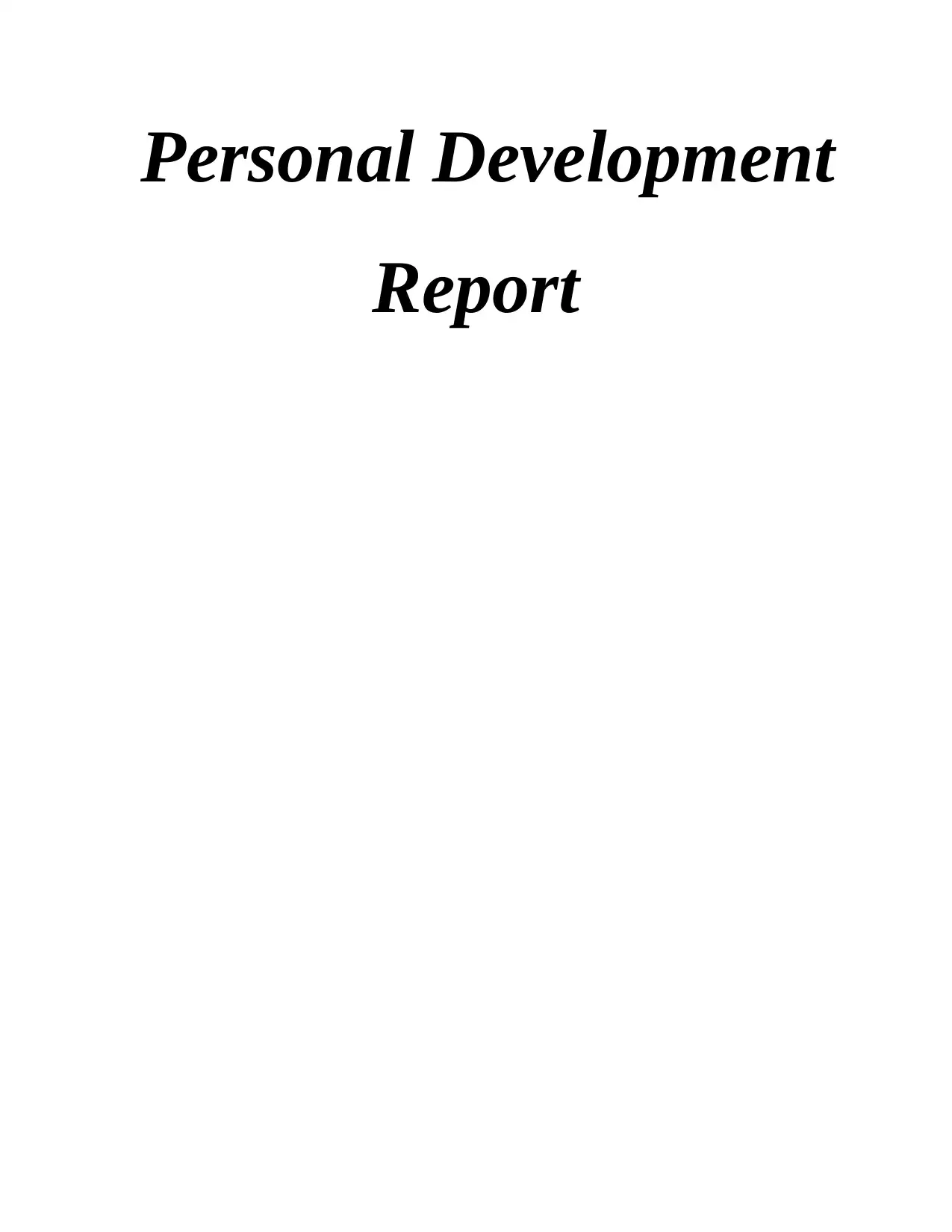
Personal Development
Report
Report
Paraphrase This Document
Need a fresh take? Get an instant paraphrase of this document with our AI Paraphraser
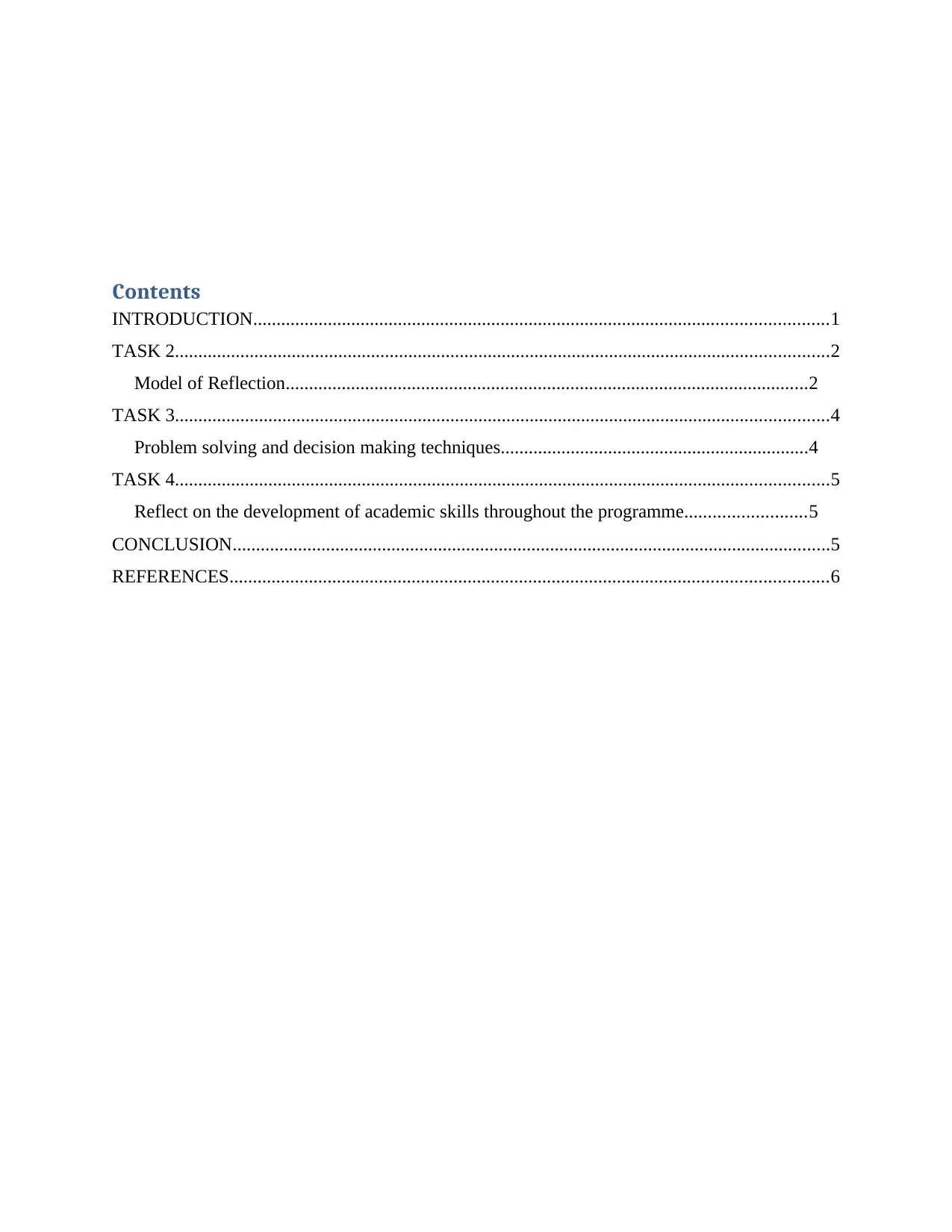
Contents
INTRODUCTION...........................................................................................................................1
TASK 2............................................................................................................................................2
Model of Reflection................................................................................................................2
TASK 3............................................................................................................................................4
Problem solving and decision making techniques..................................................................4
TASK 4............................................................................................................................................5
Reflect on the development of academic skills throughout the programme..........................5
CONCLUSION................................................................................................................................5
REFERENCES................................................................................................................................6
INTRODUCTION...........................................................................................................................1
TASK 2............................................................................................................................................2
Model of Reflection................................................................................................................2
TASK 3............................................................................................................................................4
Problem solving and decision making techniques..................................................................4
TASK 4............................................................................................................................................5
Reflect on the development of academic skills throughout the programme..........................5
CONCLUSION................................................................................................................................5
REFERENCES................................................................................................................................6
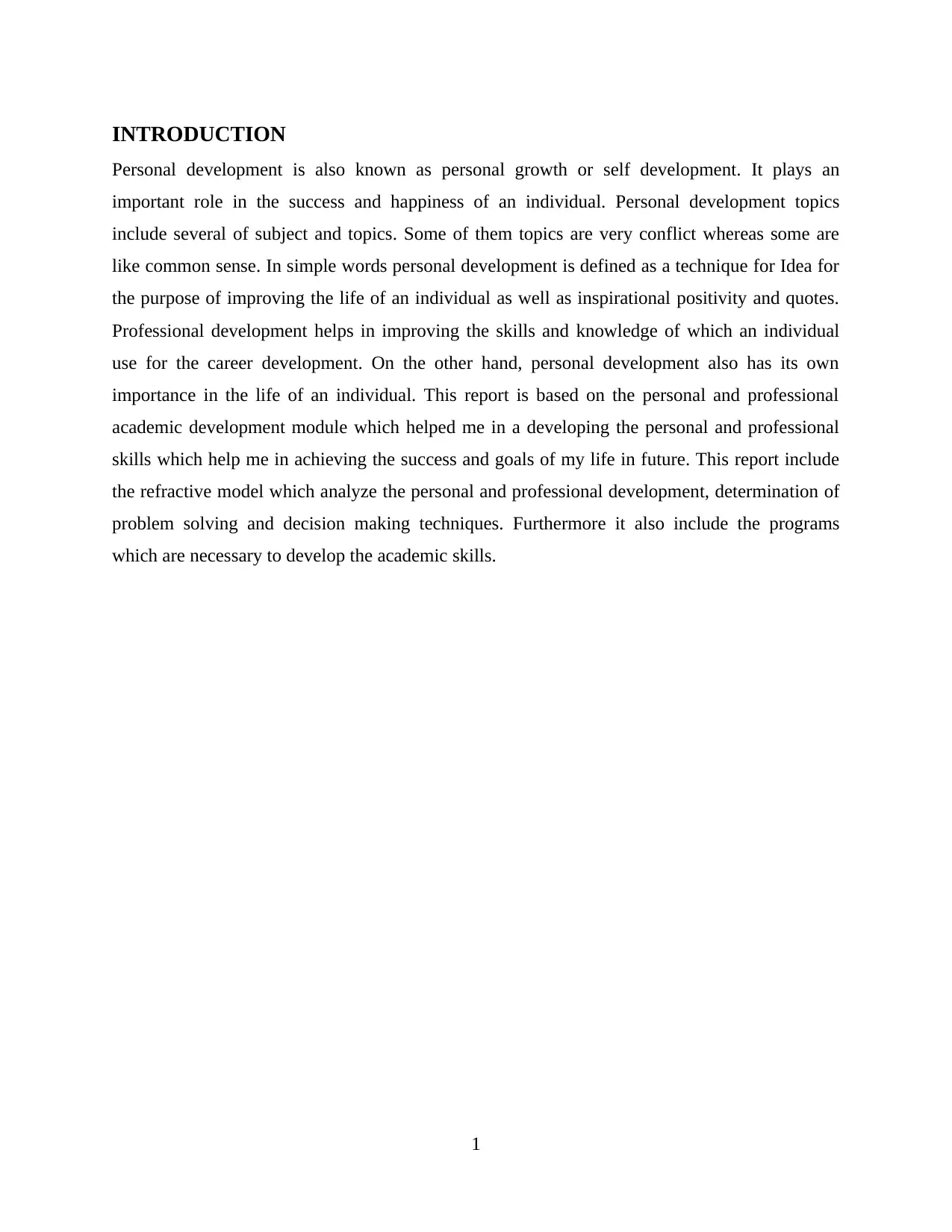
INTRODUCTION
Personal development is also known as personal growth or self development. It plays an
important role in the success and happiness of an individual. Personal development topics
include several of subject and topics. Some of them topics are very conflict whereas some are
like common sense. In simple words personal development is defined as a technique for Idea for
the purpose of improving the life of an individual as well as inspirational positivity and quotes.
Professional development helps in improving the skills and knowledge of which an individual
use for the career development. On the other hand, personal development also has its own
importance in the life of an individual. This report is based on the personal and professional
academic development module which helped me in a developing the personal and professional
skills which help me in achieving the success and goals of my life in future. This report include
the refractive model which analyze the personal and professional development, determination of
problem solving and decision making techniques. Furthermore it also include the programs
which are necessary to develop the academic skills.
1
Personal development is also known as personal growth or self development. It plays an
important role in the success and happiness of an individual. Personal development topics
include several of subject and topics. Some of them topics are very conflict whereas some are
like common sense. In simple words personal development is defined as a technique for Idea for
the purpose of improving the life of an individual as well as inspirational positivity and quotes.
Professional development helps in improving the skills and knowledge of which an individual
use for the career development. On the other hand, personal development also has its own
importance in the life of an individual. This report is based on the personal and professional
academic development module which helped me in a developing the personal and professional
skills which help me in achieving the success and goals of my life in future. This report include
the refractive model which analyze the personal and professional development, determination of
problem solving and decision making techniques. Furthermore it also include the programs
which are necessary to develop the academic skills.
1
⊘ This is a preview!⊘
Do you want full access?
Subscribe today to unlock all pages.

Trusted by 1+ million students worldwide
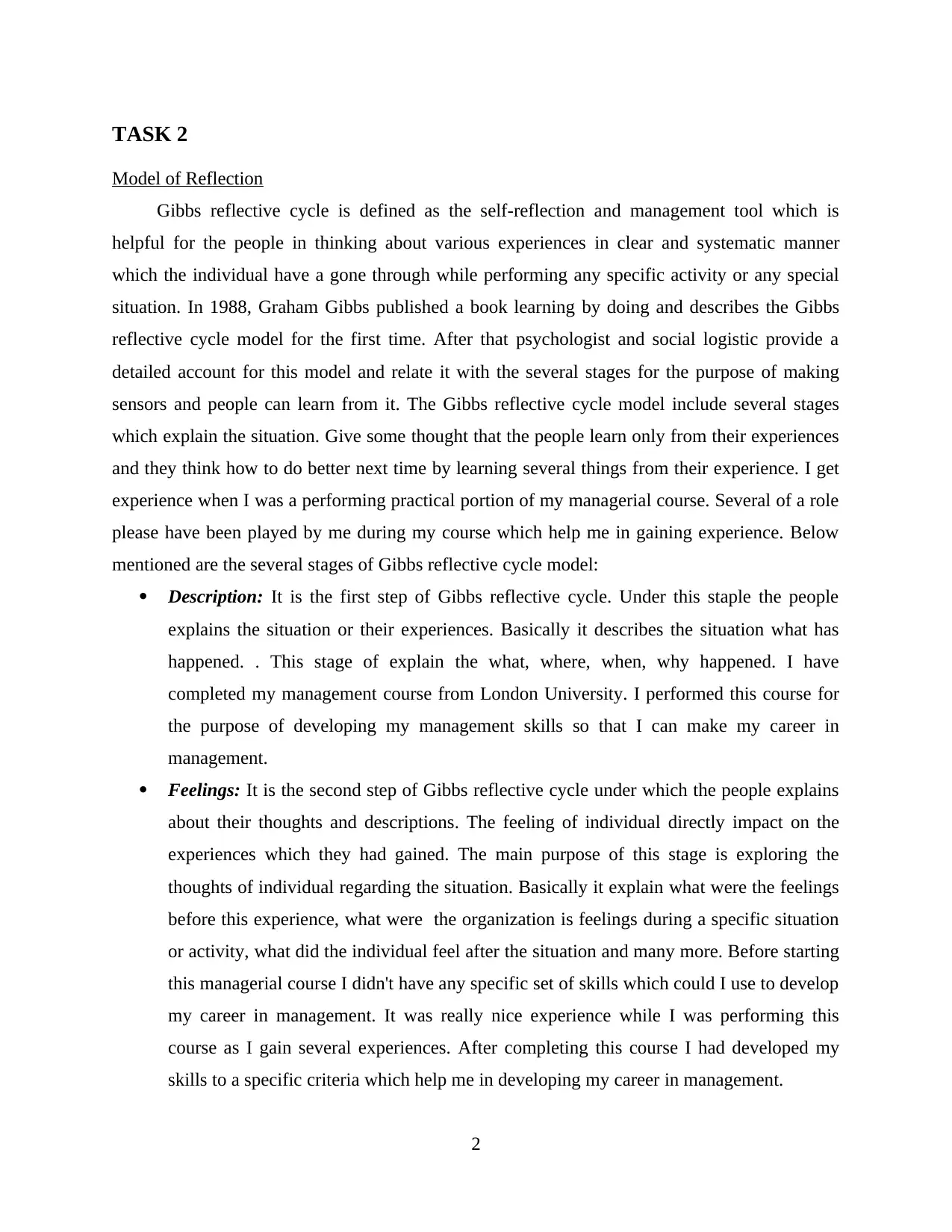
TASK 2
Model of Reflection
Gibbs reflective cycle is defined as the self-reflection and management tool which is
helpful for the people in thinking about various experiences in clear and systematic manner
which the individual have a gone through while performing any specific activity or any special
situation. In 1988, Graham Gibbs published a book learning by doing and describes the Gibbs
reflective cycle model for the first time. After that psychologist and social logistic provide a
detailed account for this model and relate it with the several stages for the purpose of making
sensors and people can learn from it. The Gibbs reflective cycle model include several stages
which explain the situation. Give some thought that the people learn only from their experiences
and they think how to do better next time by learning several things from their experience. I get
experience when I was a performing practical portion of my managerial course. Several of a role
please have been played by me during my course which help me in gaining experience. Below
mentioned are the several stages of Gibbs reflective cycle model:
Description: It is the first step of Gibbs reflective cycle. Under this staple the people
explains the situation or their experiences. Basically it describes the situation what has
happened. . This stage of explain the what, where, when, why happened. I have
completed my management course from London University. I performed this course for
the purpose of developing my management skills so that I can make my career in
management.
Feelings: It is the second step of Gibbs reflective cycle under which the people explains
about their thoughts and descriptions. The feeling of individual directly impact on the
experiences which they had gained. The main purpose of this stage is exploring the
thoughts of individual regarding the situation. Basically it explain what were the feelings
before this experience, what were the organization is feelings during a specific situation
or activity, what did the individual feel after the situation and many more. Before starting
this managerial course I didn't have any specific set of skills which could I use to develop
my career in management. It was really nice experience while I was performing this
course as I gain several experiences. After completing this course I had developed my
skills to a specific criteria which help me in developing my career in management.
2
Model of Reflection
Gibbs reflective cycle is defined as the self-reflection and management tool which is
helpful for the people in thinking about various experiences in clear and systematic manner
which the individual have a gone through while performing any specific activity or any special
situation. In 1988, Graham Gibbs published a book learning by doing and describes the Gibbs
reflective cycle model for the first time. After that psychologist and social logistic provide a
detailed account for this model and relate it with the several stages for the purpose of making
sensors and people can learn from it. The Gibbs reflective cycle model include several stages
which explain the situation. Give some thought that the people learn only from their experiences
and they think how to do better next time by learning several things from their experience. I get
experience when I was a performing practical portion of my managerial course. Several of a role
please have been played by me during my course which help me in gaining experience. Below
mentioned are the several stages of Gibbs reflective cycle model:
Description: It is the first step of Gibbs reflective cycle. Under this staple the people
explains the situation or their experiences. Basically it describes the situation what has
happened. . This stage of explain the what, where, when, why happened. I have
completed my management course from London University. I performed this course for
the purpose of developing my management skills so that I can make my career in
management.
Feelings: It is the second step of Gibbs reflective cycle under which the people explains
about their thoughts and descriptions. The feeling of individual directly impact on the
experiences which they had gained. The main purpose of this stage is exploring the
thoughts of individual regarding the situation. Basically it explain what were the feelings
before this experience, what were the organization is feelings during a specific situation
or activity, what did the individual feel after the situation and many more. Before starting
this managerial course I didn't have any specific set of skills which could I use to develop
my career in management. It was really nice experience while I was performing this
course as I gain several experiences. After completing this course I had developed my
skills to a specific criteria which help me in developing my career in management.
2
Paraphrase This Document
Need a fresh take? Get an instant paraphrase of this document with our AI Paraphraser
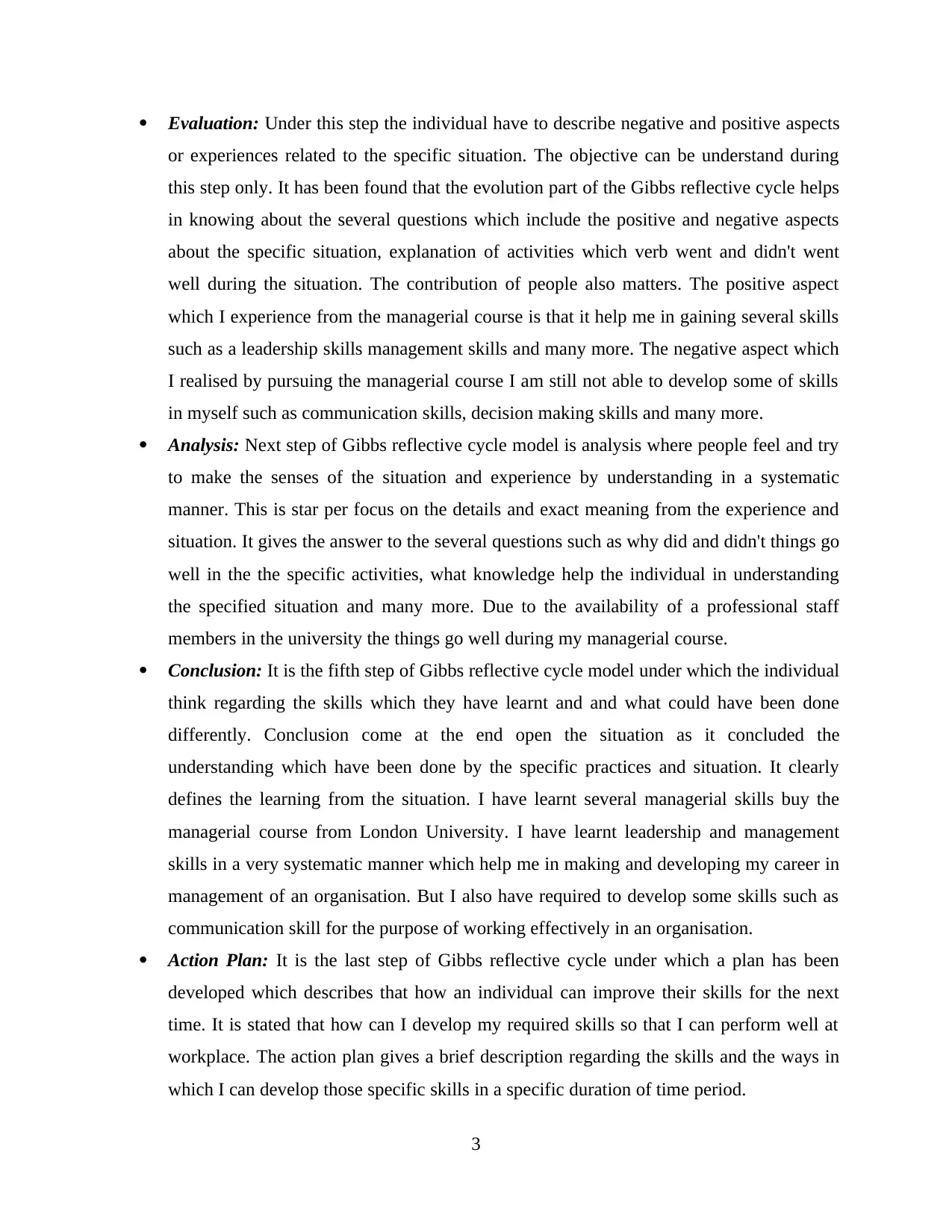
Evaluation: Under this step the individual have to describe negative and positive aspects
or experiences related to the specific situation. The objective can be understand during
this step only. It has been found that the evolution part of the Gibbs reflective cycle helps
in knowing about the several questions which include the positive and negative aspects
about the specific situation, explanation of activities which verb went and didn't went
well during the situation. The contribution of people also matters. The positive aspect
which I experience from the managerial course is that it help me in gaining several skills
such as a leadership skills management skills and many more. The negative aspect which
I realised by pursuing the managerial course I am still not able to develop some of skills
in myself such as communication skills, decision making skills and many more.
Analysis: Next step of Gibbs reflective cycle model is analysis where people feel and try
to make the senses of the situation and experience by understanding in a systematic
manner. This is star per focus on the details and exact meaning from the experience and
situation. It gives the answer to the several questions such as why did and didn't things go
well in the the specific activities, what knowledge help the individual in understanding
the specified situation and many more. Due to the availability of a professional staff
members in the university the things go well during my managerial course.
Conclusion: It is the fifth step of Gibbs reflective cycle model under which the individual
think regarding the skills which they have learnt and and what could have been done
differently. Conclusion come at the end open the situation as it concluded the
understanding which have been done by the specific practices and situation. It clearly
defines the learning from the situation. I have learnt several managerial skills buy the
managerial course from London University. I have learnt leadership and management
skills in a very systematic manner which help me in making and developing my career in
management of an organisation. But I also have required to develop some skills such as
communication skill for the purpose of working effectively in an organisation.
Action Plan: It is the last step of Gibbs reflective cycle under which a plan has been
developed which describes that how an individual can improve their skills for the next
time. It is stated that how can I develop my required skills so that I can perform well at
workplace. The action plan gives a brief description regarding the skills and the ways in
which I can develop those specific skills in a specific duration of time period.
3
or experiences related to the specific situation. The objective can be understand during
this step only. It has been found that the evolution part of the Gibbs reflective cycle helps
in knowing about the several questions which include the positive and negative aspects
about the specific situation, explanation of activities which verb went and didn't went
well during the situation. The contribution of people also matters. The positive aspect
which I experience from the managerial course is that it help me in gaining several skills
such as a leadership skills management skills and many more. The negative aspect which
I realised by pursuing the managerial course I am still not able to develop some of skills
in myself such as communication skills, decision making skills and many more.
Analysis: Next step of Gibbs reflective cycle model is analysis where people feel and try
to make the senses of the situation and experience by understanding in a systematic
manner. This is star per focus on the details and exact meaning from the experience and
situation. It gives the answer to the several questions such as why did and didn't things go
well in the the specific activities, what knowledge help the individual in understanding
the specified situation and many more. Due to the availability of a professional staff
members in the university the things go well during my managerial course.
Conclusion: It is the fifth step of Gibbs reflective cycle model under which the individual
think regarding the skills which they have learnt and and what could have been done
differently. Conclusion come at the end open the situation as it concluded the
understanding which have been done by the specific practices and situation. It clearly
defines the learning from the situation. I have learnt several managerial skills buy the
managerial course from London University. I have learnt leadership and management
skills in a very systematic manner which help me in making and developing my career in
management of an organisation. But I also have required to develop some skills such as
communication skill for the purpose of working effectively in an organisation.
Action Plan: It is the last step of Gibbs reflective cycle under which a plan has been
developed which describes that how an individual can improve their skills for the next
time. It is stated that how can I develop my required skills so that I can perform well at
workplace. The action plan gives a brief description regarding the skills and the ways in
which I can develop those specific skills in a specific duration of time period.
3
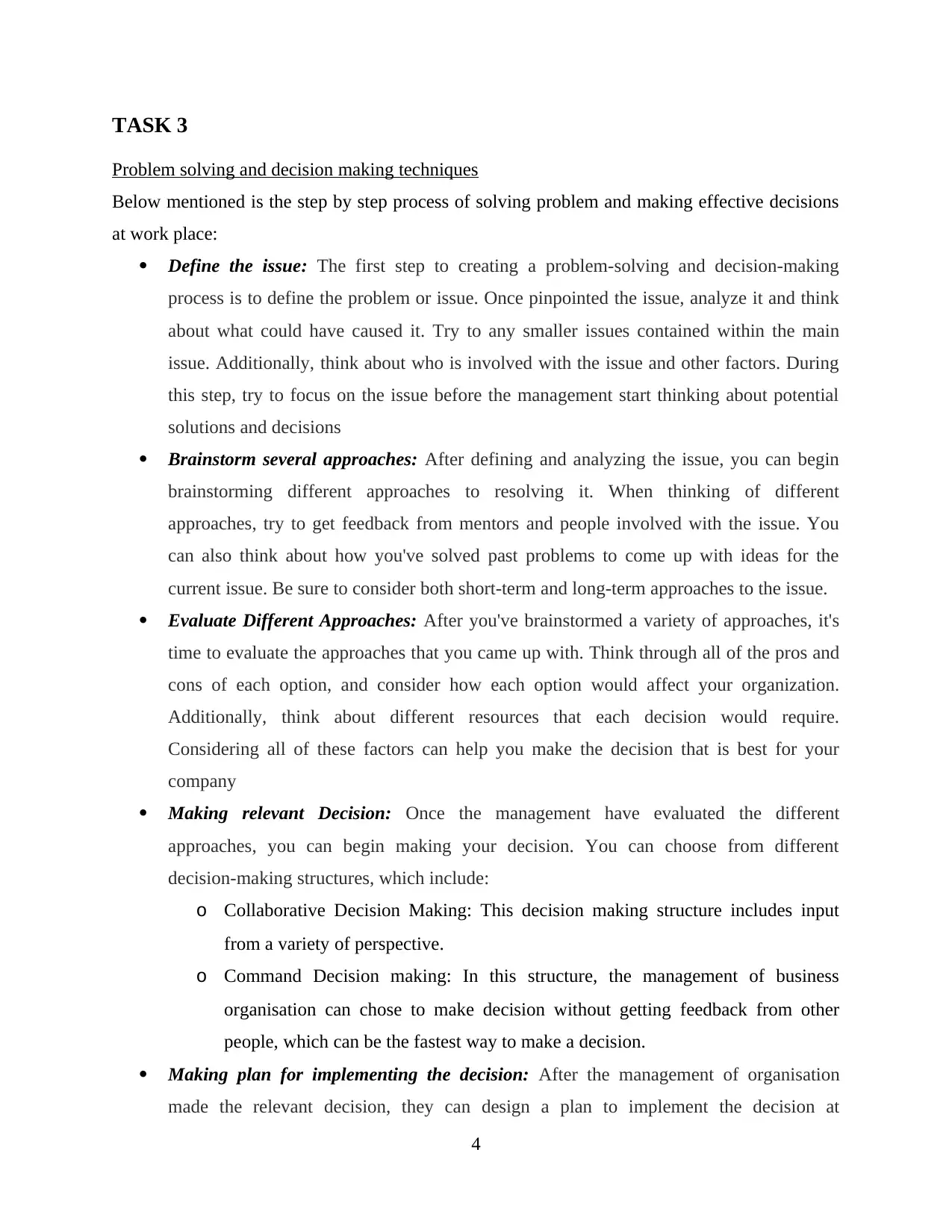
TASK 3
Problem solving and decision making techniques
Below mentioned is the step by step process of solving problem and making effective decisions
at work place:
Define the issue: The first step to creating a problem-solving and decision-making
process is to define the problem or issue. Once pinpointed the issue, analyze it and think
about what could have caused it. Try to any smaller issues contained within the main
issue. Additionally, think about who is involved with the issue and other factors. During
this step, try to focus on the issue before the management start thinking about potential
solutions and decisions
Brainstorm several approaches: After defining and analyzing the issue, you can begin
brainstorming different approaches to resolving it. When thinking of different
approaches, try to get feedback from mentors and people involved with the issue. You
can also think about how you've solved past problems to come up with ideas for the
current issue. Be sure to consider both short-term and long-term approaches to the issue.
Evaluate Different Approaches: After you've brainstormed a variety of approaches, it's
time to evaluate the approaches that you came up with. Think through all of the pros and
cons of each option, and consider how each option would affect your organization.
Additionally, think about different resources that each decision would require.
Considering all of these factors can help you make the decision that is best for your
company
Making relevant Decision: Once the management have evaluated the different
approaches, you can begin making your decision. You can choose from different
decision-making structures, which include:
o Collaborative Decision Making: This decision making structure includes input
from a variety of perspective.
o Command Decision making: In this structure, the management of business
organisation can chose to make decision without getting feedback from other
people, which can be the fastest way to make a decision.
Making plan for implementing the decision: After the management of organisation
made the relevant decision, they can design a plan to implement the decision at
4
Problem solving and decision making techniques
Below mentioned is the step by step process of solving problem and making effective decisions
at work place:
Define the issue: The first step to creating a problem-solving and decision-making
process is to define the problem or issue. Once pinpointed the issue, analyze it and think
about what could have caused it. Try to any smaller issues contained within the main
issue. Additionally, think about who is involved with the issue and other factors. During
this step, try to focus on the issue before the management start thinking about potential
solutions and decisions
Brainstorm several approaches: After defining and analyzing the issue, you can begin
brainstorming different approaches to resolving it. When thinking of different
approaches, try to get feedback from mentors and people involved with the issue. You
can also think about how you've solved past problems to come up with ideas for the
current issue. Be sure to consider both short-term and long-term approaches to the issue.
Evaluate Different Approaches: After you've brainstormed a variety of approaches, it's
time to evaluate the approaches that you came up with. Think through all of the pros and
cons of each option, and consider how each option would affect your organization.
Additionally, think about different resources that each decision would require.
Considering all of these factors can help you make the decision that is best for your
company
Making relevant Decision: Once the management have evaluated the different
approaches, you can begin making your decision. You can choose from different
decision-making structures, which include:
o Collaborative Decision Making: This decision making structure includes input
from a variety of perspective.
o Command Decision making: In this structure, the management of business
organisation can chose to make decision without getting feedback from other
people, which can be the fastest way to make a decision.
Making plan for implementing the decision: After the management of organisation
made the relevant decision, they can design a plan to implement the decision at
4
⊘ This is a preview!⊘
Do you want full access?
Subscribe today to unlock all pages.

Trusted by 1+ million students worldwide
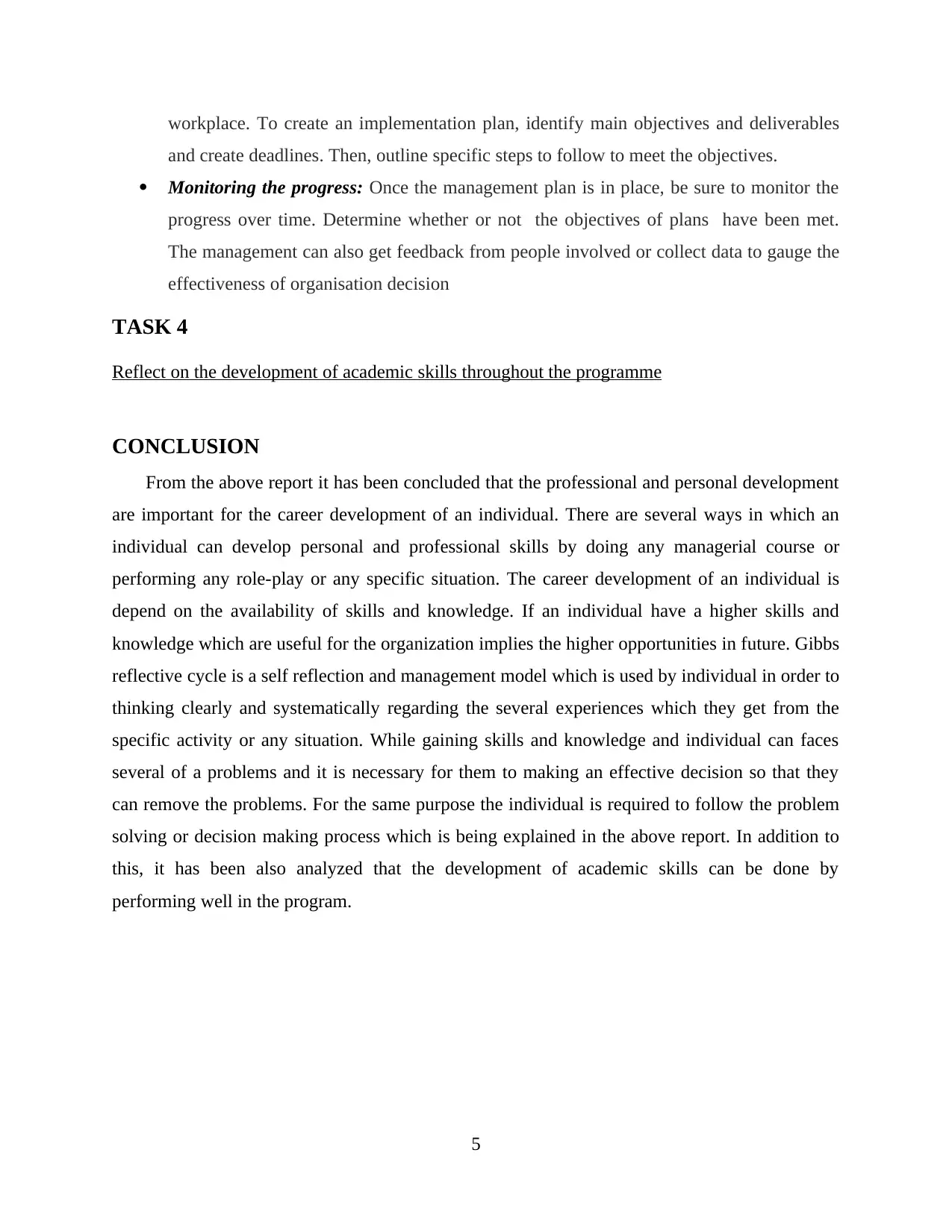
workplace. To create an implementation plan, identify main objectives and deliverables
and create deadlines. Then, outline specific steps to follow to meet the objectives.
Monitoring the progress: Once the management plan is in place, be sure to monitor the
progress over time. Determine whether or not the objectives of plans have been met.
The management can also get feedback from people involved or collect data to gauge the
effectiveness of organisation decision
TASK 4
Reflect on the development of academic skills throughout the programme
CONCLUSION
From the above report it has been concluded that the professional and personal development
are important for the career development of an individual. There are several ways in which an
individual can develop personal and professional skills by doing any managerial course or
performing any role-play or any specific situation. The career development of an individual is
depend on the availability of skills and knowledge. If an individual have a higher skills and
knowledge which are useful for the organization implies the higher opportunities in future. Gibbs
reflective cycle is a self reflection and management model which is used by individual in order to
thinking clearly and systematically regarding the several experiences which they get from the
specific activity or any situation. While gaining skills and knowledge and individual can faces
several of a problems and it is necessary for them to making an effective decision so that they
can remove the problems. For the same purpose the individual is required to follow the problem
solving or decision making process which is being explained in the above report. In addition to
this, it has been also analyzed that the development of academic skills can be done by
performing well in the program.
5
and create deadlines. Then, outline specific steps to follow to meet the objectives.
Monitoring the progress: Once the management plan is in place, be sure to monitor the
progress over time. Determine whether or not the objectives of plans have been met.
The management can also get feedback from people involved or collect data to gauge the
effectiveness of organisation decision
TASK 4
Reflect on the development of academic skills throughout the programme
CONCLUSION
From the above report it has been concluded that the professional and personal development
are important for the career development of an individual. There are several ways in which an
individual can develop personal and professional skills by doing any managerial course or
performing any role-play or any specific situation. The career development of an individual is
depend on the availability of skills and knowledge. If an individual have a higher skills and
knowledge which are useful for the organization implies the higher opportunities in future. Gibbs
reflective cycle is a self reflection and management model which is used by individual in order to
thinking clearly and systematically regarding the several experiences which they get from the
specific activity or any situation. While gaining skills and knowledge and individual can faces
several of a problems and it is necessary for them to making an effective decision so that they
can remove the problems. For the same purpose the individual is required to follow the problem
solving or decision making process which is being explained in the above report. In addition to
this, it has been also analyzed that the development of academic skills can be done by
performing well in the program.
5
Paraphrase This Document
Need a fresh take? Get an instant paraphrase of this document with our AI Paraphraser
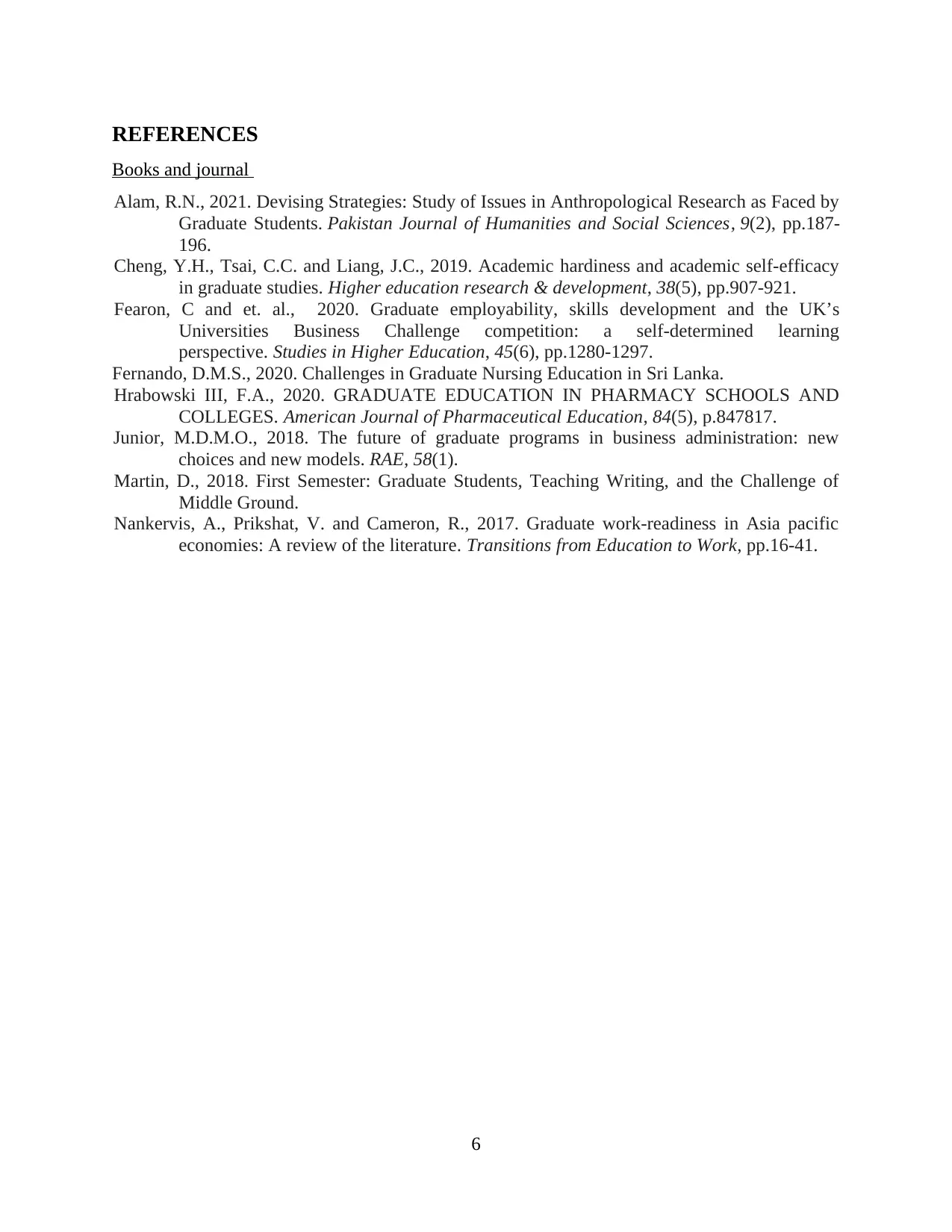
REFERENCES
Books and journal
Alam, R.N., 2021. Devising Strategies: Study of Issues in Anthropological Research as Faced by
Graduate Students. Pakistan Journal of Humanities and Social Sciences, 9(2), pp.187-
196.
Cheng, Y.H., Tsai, C.C. and Liang, J.C., 2019. Academic hardiness and academic self-efficacy
in graduate studies. Higher education research & development, 38(5), pp.907-921.
Fearon, C and et. al., 2020. Graduate employability, skills development and the UK’s
Universities Business Challenge competition: a self-determined learning
perspective. Studies in Higher Education, 45(6), pp.1280-1297.
Fernando, D.M.S., 2020. Challenges in Graduate Nursing Education in Sri Lanka.
Hrabowski III, F.A., 2020. GRADUATE EDUCATION IN PHARMACY SCHOOLS AND
COLLEGES. American Journal of Pharmaceutical Education, 84(5), p.847817.
Junior, M.D.M.O., 2018. The future of graduate programs in business administration: new
choices and new models. RAE, 58(1).
Martin, D., 2018. First Semester: Graduate Students, Teaching Writing, and the Challenge of
Middle Ground.
Nankervis, A., Prikshat, V. and Cameron, R., 2017. Graduate work-readiness in Asia pacific
economies: A review of the literature. Transitions from Education to Work, pp.16-41.
6
Books and journal
Alam, R.N., 2021. Devising Strategies: Study of Issues in Anthropological Research as Faced by
Graduate Students. Pakistan Journal of Humanities and Social Sciences, 9(2), pp.187-
196.
Cheng, Y.H., Tsai, C.C. and Liang, J.C., 2019. Academic hardiness and academic self-efficacy
in graduate studies. Higher education research & development, 38(5), pp.907-921.
Fearon, C and et. al., 2020. Graduate employability, skills development and the UK’s
Universities Business Challenge competition: a self-determined learning
perspective. Studies in Higher Education, 45(6), pp.1280-1297.
Fernando, D.M.S., 2020. Challenges in Graduate Nursing Education in Sri Lanka.
Hrabowski III, F.A., 2020. GRADUATE EDUCATION IN PHARMACY SCHOOLS AND
COLLEGES. American Journal of Pharmaceutical Education, 84(5), p.847817.
Junior, M.D.M.O., 2018. The future of graduate programs in business administration: new
choices and new models. RAE, 58(1).
Martin, D., 2018. First Semester: Graduate Students, Teaching Writing, and the Challenge of
Middle Ground.
Nankervis, A., Prikshat, V. and Cameron, R., 2017. Graduate work-readiness in Asia pacific
economies: A review of the literature. Transitions from Education to Work, pp.16-41.
6
1 out of 8
Related Documents
Your All-in-One AI-Powered Toolkit for Academic Success.
+13062052269
info@desklib.com
Available 24*7 on WhatsApp / Email
![[object Object]](/_next/static/media/star-bottom.7253800d.svg)
Unlock your academic potential
Copyright © 2020–2026 A2Z Services. All Rights Reserved. Developed and managed by ZUCOL.




